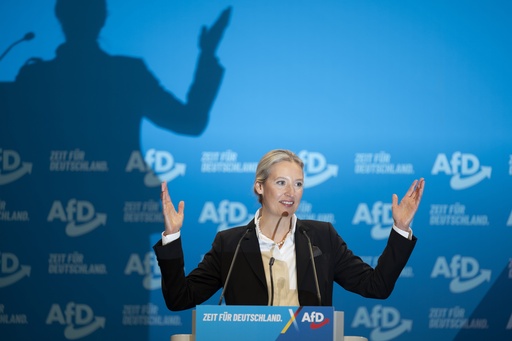Thousands of individuals rallied against the far-right Alternative for Germany (AfD) during its convention in Riesa, situated in the eastern state of Saxony, on Saturday. The protest led to road blockages, which delayed the beginning of the meeting as various parties commenced their campaigns ahead of the country’s elections scheduled for next month.
A substantial police presence was deployed in Riesa, known as a bastion for AfD, resulting in law enforcement clearing some demonstrators from the area. Despite the disturbances, the two-day convention commenced over two hours late due to the blockades impacting many delegates’ travel to the event.
During the gathering, the AfD officially nominated co-leader Alice Weidel as its candidate for chancellor through a unanimous vote. Weidel, who experienced delays herself, expressed gratitude to the delegates for their determination in reaching the convention venue, despite opposition from what she termed the “left-wing mob.”
Current polling indicates that AfD is in second place ahead of the February 23 election, garnering approximately 20% support. Nevertheless, Weidel’s aspiration to become Germany’s leader is seen as unlikely, given that other political parties refuse to collaborate with AfD. The leading position in the polls is held by the mainstream conservative opposition, the Union bloc, which shows about 30% support. Friedrich Merz, their candidate, is favored to succeed as chancellor.
The Union bloc is emphasizing initiatives aimed at revitalizing Germany’s sluggish economy and addressing irregular migration. Weidel criticized the Union as a “party of fraudsters” and enticed voters to “choose the original” by supporting AfD. She advocated for stringent immigration policies, including closing Germany’s borders to undocumented migrants and enacting large-scale deportations of asylum-seekers, unapologetically using the controversial term “remigration.”
Weidel also made a promise to restore the Nord Stream gas pipeline, which sustained damage from explosions in 2022, shortly after a halt in gas supplies from Russia. The audience responded enthusiastically when she pledged that AfD would dismantle all wind turbines, branding them as “windmills of shame,” if her party gained control.
Meanwhile, at a press conference in Hamburg, Merz focused on his party’s commitment to deliver “fundamental change” following the fall of Chancellor Olaf Scholz’s coalition, which had been marked by unpopularity and tensions. He expressed his ambition to lead a government that would foster a cooperative environment and create stable laws beneficial for both domestic and international investors. He asserted that this approach would lay the groundwork for increased potential and actual economic growth.
Chancellor Scholz is aiming for an unexpected comeback but has seen little shift in polling, with his Social Democrats trailing at 14-17%. His coalition dissolved in November after he dismissed his finance minister over economic revitalization disputes, resulting in an early election.
Acknowledging the errors made during his tenure, Scholz admitted the coalition could have ended sooner. He encouraged his party members to focus on the future rather than dwell on past mistakes, urging them to unite for the upcoming elections at a party gathering in Berlin where he confirmed his candidacy.
Scholz rebuked Merz’s Union for lacking concrete strategies to address Germany’s pressing issues and accused them of making “expensive promises for the absolute top earners,” which he claimed would destabilize the country’s budget significantly.
Additionally, Scholz reinforced his commitment to a “steadfast and prudent” approach regarding military support for Ukraine while reaffirming his stance against President-elect Donald Trump’s recent territorial claims, emphasizing that the “principle of the inviolability of borders” should apply universally to all nations, citing the importance of respecting this principle.
Merz responded by stating that “public finger-pointing from Germany has never made an impression in America” and typically produces unfavorable outcomes.



